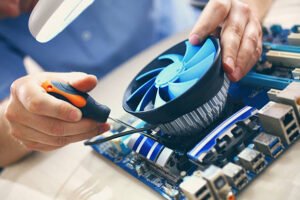A slow laptop can make even the simplest tasks feel exhausting. Whether your device is old or brand new, dealing with sluggish performance is incredibly frustrating. Many users notice a reduced performance over time, especially when their laptops have been used heavily for multitasking or gaming.
The problem often comes down to insufficient RAM, low memory, or high CPU usage. If too many programs are running, or multiple browser tabs are open, the device struggles to keep up. Outdated software and missing drives also impact speed. Worse, lurking malware and viruses can secretly drain system resources.
This guide will walk you through the common causes of slow devices. You’ll learn how to diagnose the issue and find ways to improve your laptop’s speed. By the end, you’ll have a better understanding of what’s slowing things down and how to fix it effectively.
Ways to Improve a Laptop’s Speed
A slow laptop can be frustrating, but the good news is there are ways to make it perform better. One of the easiest solutions is cleaning up your device by removing unnecessary files and disused applications that take up space. A disk cleanup can help free up storage, while regular antivirus scans ensure that malware isn’t slowing things down. Additionally, keeping your operating systems and programs up to date can enhance performance and security.
Another way to speed things up is by preventing overheating, which can throttle your laptop’s performance. Dust buildup inside can block airflow, so cleaning the internals can help. If your device still feels sluggish, consider upgrading RAM—more memory allows your system to handle multiple tasks smoothly. Getting rid of bloatware also makes a noticeable difference. These troubleshooting steps can significantly improve performance and extend your laptop’s lifespan.
What Things Can Slow Down Your Gaming Laptop
Background Programs
Many applications continue to run in the background, even when you’re not actively using them. These programs perform actions like software updates, antivirus checks, and other essential tasks that help keep your laptop secure and up to date. However, too many background programs can slow down your device, consuming valuable system resources and affecting performance.
It’s important to review which programs are running continuously and decide which ones can be closed. While some are necessary, others might not be needed all the time. Managing these background processes can free up memory, making your laptop more responsive and efficient.
Fragmented Hard Drives
One major culprit behind slow laptops is a full hard drive. When your memory space is stretched, your system struggles to function efficiently, which can cause poor performance. Over time, removable storage and hard drives can become fragmented, meaning pieces of files are scattered across your disks. This slows down data retrieval and impacts overall speed.
To fix this, ensure you perform regular disk cleanups to consolidate fragmented data. Deleting unnecessary large applications and unused files can also free up space. If you no longer need certain programs, remove them to improve system efficiency. Proper maintenance prevents slowdowns and ensures your laptop runs smoothly anymore.
Malware And Viruses
A slowdown in your laptop could be caused by hidden malware or viruses that affect system performance. It is essential to run regular antivirus scans to eliminate any threats before they cause further damage. However, there is a dichotomy in using antivirus software—some are notorious for causing slow speed due to constant background virus checks. To avoid this, it is important to research the best software for your device and ensure that the latest version is installed.
To maintain performance, users should set scans to run at appropriate times, such as when they are not actively using their laptop. This ensures that system resources remain free during critical tasks. A well-optimized antivirus program should strike a balance between security and speed, allowing smooth operation without unnecessary lag.
Outdated Software Or Drivers
Keeping your laptop up to date is important for maintaining good performance. If your device is running an older version of its operating system (OS), it can cause issues like slow speed and glitches. Many users forget to automatically update their software, leading to security risks and errors. Updating to the latest OS can help in fixing bugs and improving overall efficiency.
Not just the OS, but other programs like Adobe applications also require regular updates. If you continue using outdated versions, you may experience crashes or compatibility problems. Keeping all your software up to date ensures smooth functioning and prevents unnecessary disruptions.
Overheating
If your laptop is overheating, it will consume a lot of power as it tries to cool down, which can negatively affect its performance. Make sure to clean the filters and vents regularly to remove dust. Also, avoid using your device in direct sunlight as this can contribute to overheating.
For gamers, overheating can be an even bigger issue due to high demand on the system. In such cases, a gaming cooling pad can help in maintaining a safe temperature while you’re playing.
How You Can Check When Your Laptop Slow Down
Disk Cleanup
Disk cleanup is a helpful process that helps you free up space on your hard drive by removing unnecessary files and ensuring fragmented files are consolidated. It improves the overall performance of your device by cleaning out junk files and optimizing your storage. Here’s how you can do a disk cleanup on both Windows 11.
How to Clean Up Disk on Windows 11
- Open the search box in the taskbar and type “disk cleanup.”
- Select Disk Cleanup from the results.
- Choose the drive you want to clean up and click OK.
- Check the file types you want to delete in the “Files to Delete” section. You can read a description of each file by selecting it.
- Click OK and let the cleanup finish.
Check Programs On Task Manager
To keep your laptop running smoothly, it’s important to regularly check the task manager for any programs or applications that are consuming too many resources. You’ll want to look for anything that’s using high CPU, which indicates the amount of processing power your laptop needs to run certain tasks. Programs that take up excessive memory or drive space can also slow things down.
If you find chunky programs hogging your system’s resources, eliminating or closing them can boost your performance and speed up your laptop. By doing this regularly, you ensure that your device stays efficient without unnecessary programs running in the background.
Restart Your Laptop Once a Week
To ensure your laptop runs smoothly, it’s important to restart it at least once a week. This helps clear any temporary files that may be left behind by programs or operating tasks. If you notice your device is prone to overheating, it’s also a good idea to give it a break by switching it off when it’s not in use. Even if your laptop is in sleep mode, it’s still running some operating tasks, so turning it off completely will help maintain its performance.
Making a habit of restarting your laptop ensures that you’re not letting temporary files and background processes clog up your system, helping it run faster and more efficiently. This simple action will also give your laptop a chance to cool down, reducing the chances of it overheating during heavy usage.
Clear Cache
Clearing your cache regularly is a simple but effective way to improve performance on your system. Over time, temporary files can start clogging your system, slowing things down. This is where clearing the cache helps by removing unnecessary files and giving your device a fresh start.
Additionally, it’s important to clear browsing data like cookies and history, as well as closing any tabs you’re not actively using. These small actions can really speed things up and help you get the most out of your system’s capabilities.
How to Make Laptop Faster
There are several tricks you can use to make your laptop run faster without spending money on upgrades. One of the best fixes is performing system clean-ups to get rid of junk files that slow things down. This helps free up RAM, allowing the computer to handle tasks more smoothly. Another effective way is to adjust the performance setting in your system, prioritizing speed over visual effects. These simple steps can noticeably improve how your device runs.
Improve Performance with a Clean Boot
If your gaming laptop feels slow, performing a clean boot can make it faster by stopping unnecessary programs from starting when you turn it on. This method helps disable non-Windows applications that may be slowing down your system. A clean boot ensures that only essential Microsoft services are running, reducing background processes that consume resources.
Follow these steps to perform a clean boot:
- Search for “msconfig” in the box on the taskbar and open the System Configuration window.
- Select the Services menu and check the small box that says Hide all Microsoft services.
- Click Disable all to turn off third-party applications.
- Apply the changes and press OK to complete the process.
This method prevents unnecessary background applications from slowing down your laptop, making it run much more smoothly.
Check for RAM Issues with a Memory Test
If your gaming laptop is slowing down or crashing unexpectedly, a good fix is to run a memory diagnostic tool to check if your RAM has any issues. Faulty memory can cause performance problems, and testing it can help identify the root cause.
Follow these steps to perform a memory test:
- Press the Windows key + R to open the search box in the bottom left corner of the screen.
- Type “mdsched.exe” and select OK to launch the tool.
- Restart your laptop, and the test will begin automatically.
This method helps detect RAM-related issues, ensuring your system runs efficiently.
Optimize Your Laptop for Maximum Speed
If your laptop isn’t running at its best performance, you can tweak some settings to make it faster. Windows allows you to adjust system preferences to prioritize speed over visuals, ensuring smoother performance.
Follow these steps to set your PC for best performance:
- Open This PC and right-click on it.
- In Windows 11, select More options and scroll to Properties, or in Windows 10, simply click Properties.
- Go to Advanced system settings and open a new window.
- In the Advanced menu, look under performance and click Settings.
- The default first option will be ticked—change it to the third option, which is Adjust for best performance.
- Apply the changes and select OK to close the window.
Making these adjustments will allow your system to allocate resources more efficiently, giving you a noticeable boost in speed.
Frequently Asked Questions
Why is my laptop so slow over time?
A laptop’s performance can decline due to insufficient RAM, low memory, high CPU usage, outdated software, and background programs running. Regular maintenance, including disk cleanup, removing unnecessary files, and updating software, can help keep your device running smoothly.
How can I improve my laptop’s speed?
You can fix performance issues by cleaning disused files, uninstalling bloatware, running antivirus scans, and upgrading RAM. Managing background processes, optimizing startup programs, and ensuring proper airflow to prevent overheating also boosts efficiency.
What are the common causes of a slow laptop?
A full hard drive, fragmented files, excessive browser tabs open, and outdated drivers contribute to sluggish performance. Checking for malware and viruses, removing unnecessary applications, and running maintenance tasks can help restore speed.
Can overheating slow down my laptop?
Yes, overheating can throttle performance as the system struggles to stay cool. Keeping vents and filters clean, avoiding direct sunlight, and using a cooling pad for gamers can maintain optimal temperature.
How do I know if background programs are affecting my laptop’s performance?
Open Task Manager and check for programs consuming high CPU and memory. If unnecessary applications are running in the background, closing them will free up system resources, making the device more responsive.
How often should I restart my laptop?
Restarting your laptop once a week helps clear temporary files, refresh system memory, and prevent performance slowdowns. If your device stays in sleep mode, turning it off completely allows it to reset properly.
How does a clean boot help improve speed?
A clean boot disables non-Windows startup programs, reducing background processes consuming resources. Use System Configuration (msconfig) to hide all Microsoft services, disable third-party applications, and apply changes to boost performance.
Conclusion
A slow laptop can be frustrating, but with the right troubleshooting steps, you can restore its speed. Managing background tasks, keeping software updated, and ensuring proper maintenance can extend your laptop’s lifespan. Whether it’s checking system resources, performing a disk cleanup, or upgrading RAM, small improvements make a big difference. Stay proactive, and your laptop will run smoothly for years to come!








